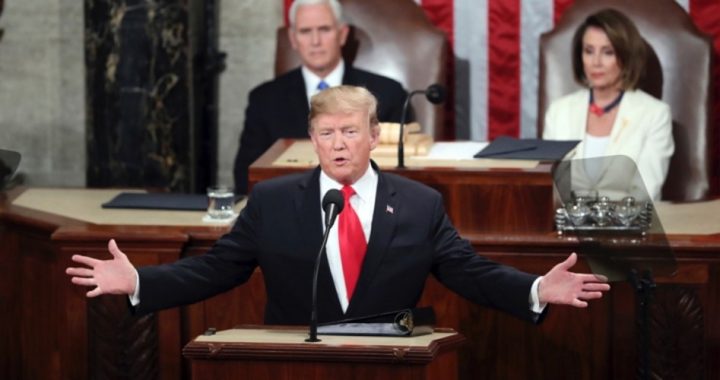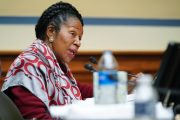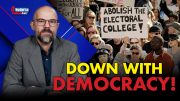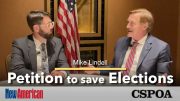
“America will never be a socialist country!” President Donald Trump declared in his State of the Union address Tuesday night — one of the boldest lines ever delivered in the traditional speech to both houses of Congress, the presidential Cabinet, the top brass of the U.S. military, and members of the Supreme Court.
Secretary of Energy Rick Perry was designated to be the lone member of the presidential line of succession to be at an undisclosed location.
While Trump began his speech calling for unity, declaring that America should be governed not as two parties, but as one nation, some Democrats rejected that appeal even before the speech began. Senate Minority Leader Chuck Schumer (D-N.Y.) denounced Trump as a divisive figure the day before the State of the Union address; far-left Representative Maxine Waters (D-Calif.) not only did not attend the speech, but she urged Americans to not even watch it on TV.
The move by House Speaker Nancy Pelosi (D-Calif.) to deny President Trump the House chamber for the speech during the partial government shutdown may have backfired, creating more interest in the delayed address.
President Ronald Reagan started the tradition of introducing special guests in the gallery, but Trump probably set the record for the practice, pointng out Buzz Aldrin (the second man on the moon), since this is the 50th anniversary of the 1969 moon landing; showcasing veterans of the D-Day invasion of 75 years ago; introducing former prisoners who were freed by the criminal justice reform that he signed or by his act of presidential commutation; praising Elvan Hernandez, an ICE agent and legal immigrant from the Dominican Republic who was responsible for hundreds of arrests of what Trump called “sadistic sex traffickers”; lauding two Holocaust survivors who were liberated by American soldiers (probably the most emotional moment of the message); and finally introducing a little girl who had survived brain cancer.
Trump also recited several statistics illustrating the robust economic conditions in America, which he said has the “hottest economy in the world.” Since he took office just a little over two years ago, the economy has added 5.3 million new jobs, including 600,000 more manufacturing jobs. “Five million Americans have been lifted off food stamps,” Trump noted, adding that the country is experiencing the lowest unemployment rate in half a century, with the lowest levels of unemployment for African-Americans, Hispanic-Americans, and Asian-Americans ever recorded.
Finally, the president noted that more people are now in the work force than ever before in American history.
Other achievements Trump cited included the income tax cut, the reduction of regulations, the virtual elimination of the estate tax (which he called “the death tax”), the termination of ObamaCare’s individual mandate, and the fact that the United States is now the number-one producer of oil and gas in the world. For the first time in 65 years, the president boasted, America is a net exporter of energy.
Trump warned, however, that this booming economy could be brought to a halt by “foolish wars, politics, and ridiculous partisan investigations.”
As expected, Trump focused on the need to secure our “very dangerous southern border,” vowing that he was committed to ending illegal immigration, calling it a “moral obligation.” But he stated that this issue — illegal immigration, and what to do about it — divides the American working class from the country’s elites like no other — the elites who hide behind their “gates and guards.”
While Trump conceded that there is no single solution to the illegal immigration problem, he declared that a “physical barrier or wall” was something that most of the people in the room had actually voted for at one time or another. “But it never got built,” Trump said, then after pausing, he added, “I will get it built.” Arguing for the efficacy of the wall, he offered the example of the wall south of San Diego. Trump said that at one time San Diego had the most illegal crossings in the country, but that the border wall ended that problem.
Trump also denounced the recent push for legalized late-term abortions, and asked Congress to prohibit the late-term abortion of children, declaring that we should have a culture that cherishes innocent life, because “all children, born and unborn, are made in the holy image of God.”
Turning to foreign policy, Trump said that he was pulling out of the INF nuclear missile treaty negotiated during the Reagan administration, because the Russians are not abiding by it. “We really have no choice,” he explained.
While he lauded the heroism of the American soldiers who have fought in the recent wars in the Middle East (with 7,000 battle deaths and $7 trillion in expenditures), he declared that it was time to bring that expedition to an end, stating, “Great nations do not fight endless wars.”
He added that America was founded on liberty and independence, and because of that, “America will never be a socialist country.”
But in a speech that lasted an hour and 22 minutes, and was interrupted over 100 times for applause (even occasionally by the mostly stone-faced Nancy Pelosi and her fellow white-clad female congressional members), there were remarks that should concern conservative Americans. While President Trump did denounce “calamitous trade policies,” and vowed to protect American jobs, instead of simply pulling out of the NAFTA trade deal, he urged members to agree to the recently negotiated United States, Mexico, and Canada (USMCA) trade agreement — an agreement that poses a serious threat to American national sovereignty.
And, of course, there was Trump’s advocacy of a “nationwide paid family leave” law. Considering that Trump also denounced socialism in the same speech, this seemed somewhat contradictory.
All in all, however, the address had the best conservative rhetoric delivered in a State of the Union message in many years. Hopefully, the rhetoric will be matched with action for the remainder of the president’s term of office. After all, even President Bill Clinton once stated, “The era of big government is over,” but sadly that did not prove to be the case.
Photo: AP Images



